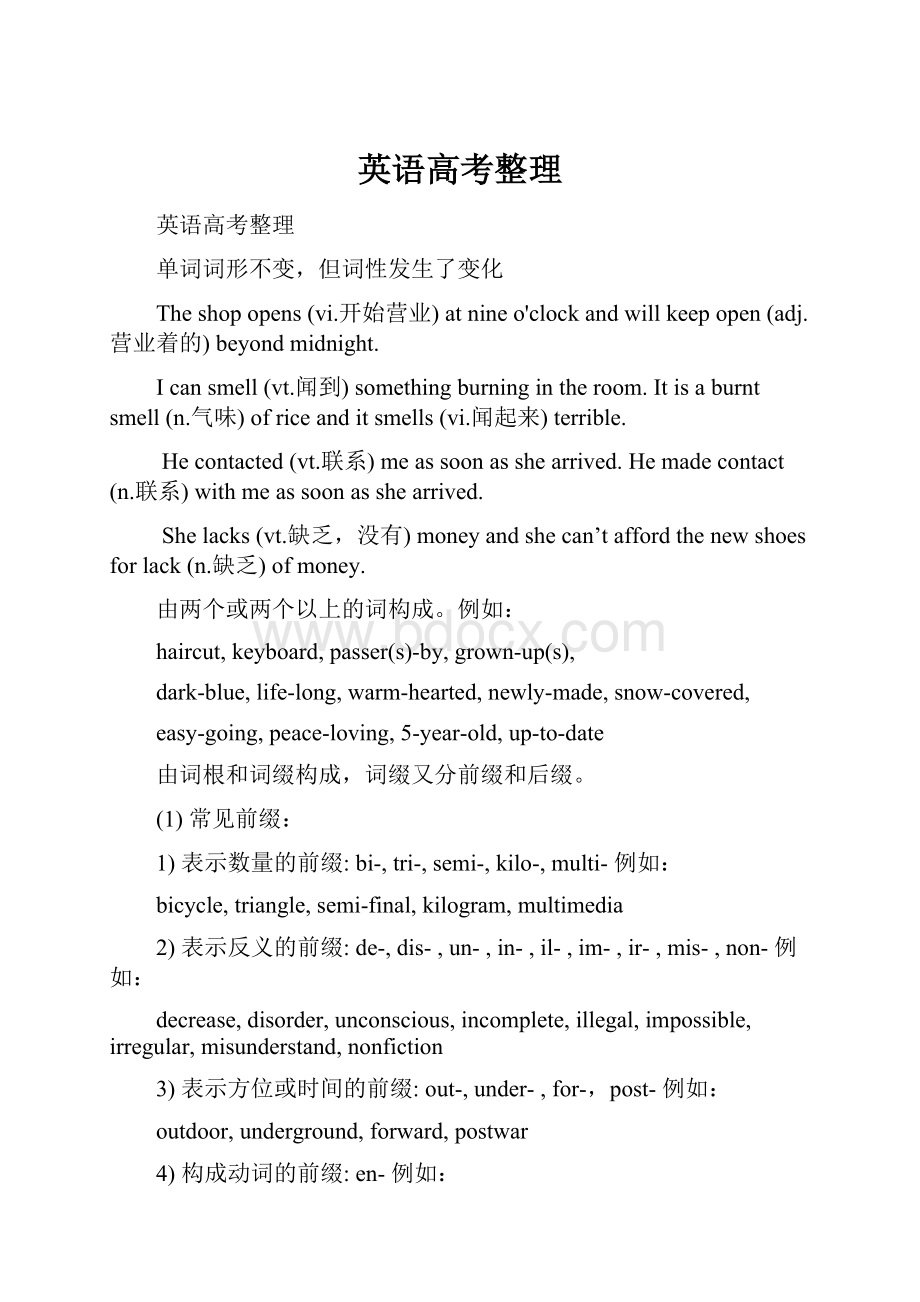英语高考整理.docx
《英语高考整理.docx》由会员分享,可在线阅读,更多相关《英语高考整理.docx(19页珍藏版)》请在冰豆网上搜索。

英语高考整理
英语高考整理
单词词形不变,但词性发生了变化
Theshopopens(vi.开始营业)atnineo'clockandwillkeepopen(adj.营业着的)beyondmidnight.
Icansmell(vt.闻到)somethingburningintheroom.Itisaburntsmell(n.气味)ofriceanditsmells(vi.闻起来)terrible.
Hecontacted(vt.联系)meassoonasshearrived.Hemadecontact(n.联系)withmeassoonasshearrived.
Shelacks(vt.缺乏,没有)moneyandshecan’taffordthenewshoesforlack(n.缺乏)ofmoney.
由两个或两个以上的词构成。
例如:
haircut,keyboard,passer(s)-by,grown-up(s),
dark-blue,life-long,warm-hearted,newly-made,snow-covered,
easy-going,peace-loving,5-year-old,up-to-date
由词根和词缀构成,词缀又分前缀和后缀。
(1)常见前缀:
1)表示数量的前缀:
bi-,tri-,semi-,kilo-,multi-例如:
bicycle,triangle,semi-final,kilogram,multimedia
2)表示反义的前缀:
de-,dis-,un-,in-,il-,im-,ir-,mis-,non-例如:
decrease,disorder,unconscious,incomplete,illegal,impossible,irregular,misunderstand,nonfiction
3)表示方位或时间的前缀:
out-,under-,for-,post-例如:
outdoor,underground,forward,postwar
4)构成动词的前缀:
en-例如:
enable,encourage
5)其它前缀:
ex-,co-,inter-,over-,pre-,re-,super-,tele-,trans-例如:
ex-president,co-operation,international,overflow,preview,rewrite,superman,telescope,transform
(2)常见后缀:
1)构成名词的后缀常见的有:
-er,-or,-ee,-ist,-ian,-ment,-ness,-ion-ity,-ance,-ence,-ure,-ship,-hood,-ism,-age例如:
interviewer,visitor,employee,typist,musician,development,willingness,attraction,admission,ability,curiosity,appearance,dependence,failure,scholarship,childhood,socialism,shortage
2)构成动词的后缀常见的有:
-ify,-en例如:
beautify,classify,sharpen,strengthen
3)构成形容词的后缀常见的有:
-able,-al,-ant,-ful,-ive,-ous,-y,-ly,-less,-ist,-ic例如:
avoidable,agricultural,resistant,cheerful,attractive,dangerous,sleepy,orderly,homeless,communist,alcoholic
4)构成副词的后缀常见的有:
-ly,-ward例如:
carefully,comfortably,backward,downward
favour
dosb.afavour=doafavourforsb.
帮某人一个忙
asksb.afavour=askafavourofsb.
请某人帮忙
inone’sfavour得某人欢心
beinfavourof赞成,支持
habit
beinthehabitofdoing有做……的习惯
=havethehabitofdoing
getintothehabitofdoing
养成做……的习惯
by/outofhabit出于习惯,潜意识地
getoutofthehabitofdoing
改掉做……的习惯
turn
taketurnstodo轮流做……
byturns轮流地
inturn依次地
inone’sturn轮到某人时
intime及时
ontime准时
time
atatime一次,每次
atonetime往昔,曾有一时
attimes有时,偶尔
atnotime在任何时候都不可……
aheadoftime提前,提早
forthetimebeing暂时
word
haveawordwithsb.与某人说句话
havewordswithsb.与某人争吵
keepone’sword守诺
eatone’swords收回前言
inaword总而言之
inotherwords换句话说
wordforword一字一字地,逐字
Wordcamethat…有消息传来……
Hand:
handinhand;beforehand;byhand;nearathand;second-hand;left-handed;handin;handout;shakehands;have…athand;agreenhand
Heart:
loseheart;learn…byheart;heartbeat;heartbreak;heartsink;heartandsoul;whole-heartedly;fromthebottomofone'
主谓一致
(1)集合名词(family,population,couple,audience,class,committee,crowd,crew,group,public,staff,team,majority,party)作主语时,作为一个整体,谓语动词用单数;若就其中每一个成员而言,动词则用复数。
例如:
HisfamilyhasmovedtoLosAngles.
HisfamilyarewatchingTVnow.
(2)集合名词(people,police,cattle)只有复数形式,谓语动词用复数。
(3)单复数同形的名词(deer,sheep,fish,means,species,series,works)作主语时,谓语动词单复数根据其意思决定。
例如:
Allmeanshavebeentriedtosolvetheproblem.
Everymeanshasbeentriedtosolvetheproblem.
(4)时间、距离、金钱等复数名词作主语时,根据意义通常把它看作一个整体,谓语用单数。
例如:
Threeyearsisindeedashorttime.
FivethousanddollarsismorethanIcanafford.
(5)以-s结尾的学科名词(mathematics,economics,politics,physics等)和专有名词(theUnitedStates,theUnitesNations等)作主语,谓语动词用单数。
例如:
Physicsistaughtwellinthisschool.
(6)带all,most,half,part,rest,percent,one-third等词的名词词组作主语时,谓语动词单复数根据其中心词的单复数决定。
例如:
Mostofmyclassmatesareleaguemembers.
Mostoftheearthiscoveredwithwater.
(7)由and或both…and连接的并列主语,谓语动词常用复数。
当并列主语指的是同一人、物或概念时,或and连接两个含有every,each,no的名词短语时,谓语动词则用单数。
例如:
Truthandhonestisthebestpolicy.
Everyboyandeverygirlwantstoservethepeopleinthefuture.
(8)以or,nor,either…or,neither…nor,notonly…butalso等连接的名词作主语时,谓语动词的单复数根据就近一致的原则。
例如:
Tomorhisbrothersarewaitingintheroom.
NeitheryounorIamwrong.
(9)以aswellas,(together/along)with,ratherthan,except,besides,but,inadditionto,including,like等连接的名词作主语时,谓语动词的单复数根据前面一个名词而定。
例如:
Theteacheraswellasthestudentswasexcited.
EveryoneexceptMaryandJohnishere.
(10)不定代词such,any,some,none,all等作主语,谓语动词的单复数根据意义而定。
例如:
Suchisourplan.
Sucharehiswords.
Allhasbeenarranged.
Allarepresent.Let’sbeginourdiscussion.
(11)Morethanone…或manya…构成的主语,谓语动词用单数,而morethantwo…或many…构成的主语,谓语动词用复数。
例如:
Manyashiphasbeendamagedinthestorm.
Morethantwostudentshaveseenthefilm.
(12)oneandahalf后接复数名词,但谓语动词用单数。
例如:
Oneandahalfapplesisleftonthetable.
(13)the+形容词/分词表示一类人,谓语动词用复数。
例如:
Theblindstudyinspecialschools.
(14)主语从句作主语时,谓语动词通常用单数,但若所指的具体内容是复数意义,谓语动词则用复数。
例如:
Whatweneedismoretime.
Whatweneedaremorequalifiedteachers.
(15)thiskind/typeof+复数名词作主语,谓语动词用单数。
例如:
Thiskindofbookssellswell.
比较:
Booksofthiskindsellwell.
it的用法
(1)it不仅可指代某样东西,还可指代人(婴儿、儿童或未知的人)。
例如:
Isitaboyoragirl?
It’sagirl.
Someoneisringingthedoorbell.Goandseewhoitis.
(2)it指代前面的内容。
例如:
Tom’smotherkepttellinghimtostudyharder,butitdidn’thelp.
(3)it可指代时间、季节、地点、天气、距离、金钱等。
例如:
Ihopeitisspringalltheyearround.
Itisnotfarfromtheschooltomyhome.
(4)it用作形式主语或形式宾语。
例如:
Itiscertainthatpricesaregoingup.
Shesoonfounditpossibletodothisregularly.
(5)it用于强调句型中,即:
Itis(was)+强调部分+that(who)…,通常被强调部分指人时用who或that,指物、时间、地点、原因等时用that。
例如:
ItisIwhoamwrong.
ItwasyesterdaythatImethermotherintheshoppingmall.
部分容易误用的代词
(1)it/one
it是人称代词,可代替前面提到过的某个特指事物,复数为them;而one是不定代词,可代替前面出现的某个可数名词,复数为ones。
例如:
Ilikethisdigitalcamera,butIcan’taffordit.
Iwouldliketohaveadigitalcamera,butIcan’taffordone.
(2)that/one
that替代被定冠词the等限定的有定语的名词,而one替代有不定冠词a/an修饰的名词。
that可替代可数或不可数名词,指代复数名词时用those,而one只能替代可数名词,复数用ones。
例如:
Foralotofstudents,theirteacher’sadviceismoreimportantthanthatoftheirparents’.
Iamlookingforaflat.I’dlikeonenearapark.
(3)each/every
1)均可作形容词,但each着重于个别性,而every侧重于整体性。
例如:
Each/Everystudentcontributedtothefund.
2)each可作定语、表语之外,还有名词性质,充当主、宾、同位语;而every只可作定语。
例如:
Theteacheraskeduseachaquestion.=Theteacheraskedeachofusaquestion.
Everyoneofyouhasachancetointroduceyourself.
3)every与not构成部分否定。
例如:
Everystudentcannotbesuccessful.=Noteverystudentcanbesuccessful.
4)every与数词的表达。
例如:
TheOlympicsareheldeveryfouryears(everyfourthyear).
(4)nothing/noone(nobody)/none
nothing和noone(nobody)指无具体范围的否定,而none指有一定范围的否定,常和of短语连用,既可指物也可指人。
试比较:
A:
Didanyonecometoseeme?
B:
Noone/Nobody(cametoseeyou).
A:
Didanyoneofmyfriendscometoseeme?
B:
None(ofyourfriendscametoseeyou).
(5)(the)other/(the)others/another
1)作定语时,other与复数名词或不可数名词连用,泛指“其他的”,与单数名词连用时前面往往有限定词或物主代词;而another与单数名词连用,意为“另一个,又一个”。
例如:
otherwaysoftranslation,otherinformation,someotherreason,myotherson,
seeyouanothertime,anotherLeiFengofourtime
2)作代词时,theother特指“两者中的另一个”,常用于词组one…theother,而theothers是theother的复数形式;others是other的复数形式,泛指“别的人或物”;another指“三者或三者以上的另一个”。
3)与数词的表达:
other位于数字后,another位于数字前。
例如:
Wouldyoupleasegivemetwootherbooks?
Wearegoingtostayhereforanotherthreeweeks(forthreemoreweeks).
4)常用词组:
inotherwords换句话说otherthan除了
theotherday不久前的一天oneafteranother一个接着一个
…isonething,and…isquiteanother……是一回事……是另一回事
(6)such的用法
1)可作主语、宾语、表语,作表语时往往置于句首。
例如:
Imayhaveoffendedhim,butsuchwasnotmyintention.
2)可用besuchthat或besuchas引导从句。
例如:
Theprogresswassuchthatitsurprisedherteacher.
3)可作定语。
例如:
Ihaveneverseensuchaninterestingperson(sointerestingaperson).
Wehavesuchgrapesasyou’veneverseen.
容易用错的数词
(1)dozen,hundred,thousand,million,score等,试比较:
twodozen(num.)eggs两打鸡蛋dozens(n.)ofeggs好几十只鸡蛋
threethousand(num.)people三千人thousands(n.)ofpeople数千人
twoscore(num.)trees四十棵树scores(n.)oftrees数十棵树
(2)表示在几十年代:
in+the+数词复数,例如:
inthe1990s(90’s/nineties)
表示某人的几十岁时:
in+物主代词+数词复数,例如:
inhisfifties
习语中的冠词
(1)一般情况下,在序数词、最高级、乐器、江河、山脉、群岛、报刊杂志等名词前要用冠词the。
在表示季节、月份、节假日、日期、星期、称呼、官衔职位、三餐、球类运动等名词前不用定冠词。
在一些习语中,有的用冠词,有的不用,没有规律,需要记忆和积累。
例如:
1)indetailonearthfrombeginningtoend
athandbyhandbychance/accident
2)forthetimebeinginthedistancepaybythehour
hitsb.ontheheadcatchsb.bythearm
3)atalossasaruletryathirdtime
apoetandnovelistamostdisagreeableexperience
(2)在某些词前用不同冠词,意义大不相同。
例如:
1)Shelistenscarefullyinclass.她上课时仔细听讲。
Sheisthebeststudentintheclass.她是班上最好的学生。
2)Charliehasgonetoschool.查理上学去了。
Charlie’sfatherwillgototheschooltoseetheheadmaster.查理父亲要到学校去见校长。
3)Theyareattable.他们在用餐。
Heissittingatthetable,doinghishomework.他坐在桌旁做作业。
4)Thereisatenniscourtinfrontoftheteachingbuilding.教学楼的前面有个网球场。
Theteachingdeskisinthefrontoftheclassroom.讲台在教室的前部。
5)Thecontesttookplaceyesterday.昨天举行比赛。
I’lltaketheplaceofmyfatherforawhile.我将暂时代替我父亲。
6)Thethreeofusknewnothingaboutit.我们三个人(我们一共有三个)对此一无所知。
OnlythreeofusgotAinthefinalexam.我们中只有三个人在终考中得A。
其它一些比较形式:
1)moreAthanB与其说B,还不如说A。
例如:
Heismoremadthanstupid.与其说他愚蠢,不如说他发疯。
2)nolessthan不少于,不亚于。
例如:
SallyisnolesscharmingthanJane.
3)nomorethan只是。
例如:
Heisnomorethanachild.=Heisonlyachild.
4)otherthan除了。
例如:
Therewasnothingtheycoulddootherthanspendthenightinthetemple.
5)ratherthan而不是。
例如:
Jackisdiligentratherthanclever.
6)wouldratherdo…thando…宁愿……也不愿……
Iwouldratherst